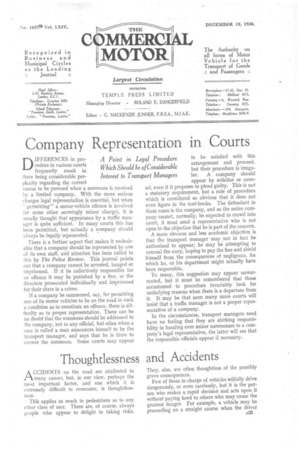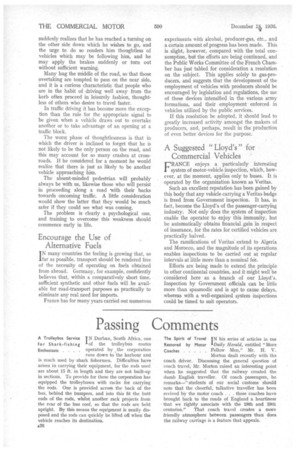Thoughtlessness and Accidents
Page 27

Page 28

If you've noticed an error in this article please click here to report it so we can fix it.
A CCIDENTS on the road are attributed to many causes, but, in our view, perhaps the most important factor, and one which it is extremely difficult to overcome, is thoughtlessness.
This applies as much to pedestrians as to any other class of user. There are, of course, always people who appear to delight in taking risks. They, also, ate often thoughtless of the possibly grave consequences. Few of those in charge of vehicles wilfully drive dangerously, or even carelessly, but it is the person who makes a rapid decision and acts upon it without paying heed to others who may cause the greatest danger. For example, a vehicle may be proceeding on a straight course when the driver suddenly realizes that he has reached a turning on the other side down which he wishes to go, and the urge to do so renders him thoughtless of vehicles which may be following him, and he may apply the brakes suddenly or turn out without sufficient warning.
Many hug the middle of the road, so that those overtaking are tempted to pass on the near side, and it is a curious characteristic that people who are in the habit of driving well away from the kerb often proceed in leisurely fashion, thoughtless of others who desire to travel faster.
In traffic driving it has become more the exception than the rule for the appropriate signal to be given when a vehicle draws out to overtake another or to take advantage of an opening at a traffic block.
The worst phase of thoughtlessness is that in which the driver is inclined to forget that he is not likely to be the only person on the road, and this may account for so many crashes at crossroads. If he considered for a moment he would realize that there is just as likely to be another vehicle approaching him.
The absent-minded pedestrian will probably always be with us, likewise those who will persist in proceeding along a road with their backs towards oncoming traffic. A little consideration would show the latter that they would be much safer if they could see what was coming.
The problem is clearly a psychological one, and training to overcome this weakness should commence early in life.




















































































